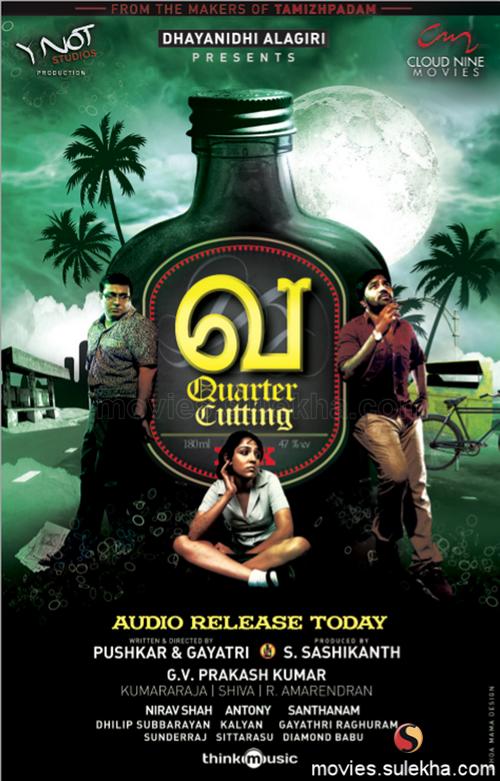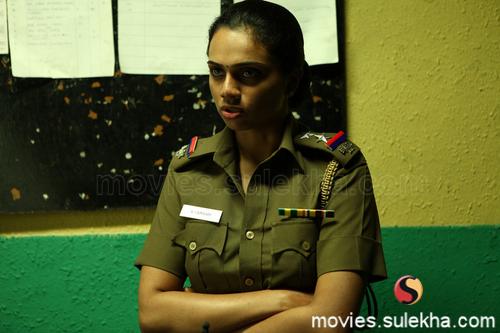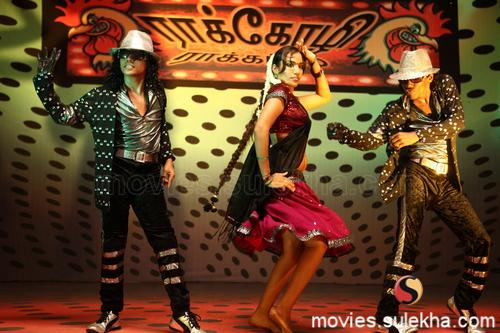
Just as I was writing another post about the film, I realised I was quite noticing PoMo elements in the film through every sentence I typed. Considering Shiva’s history in cinema, I’d be digging too much into the film if I called it Post Modern, wouldn’t I? On that thought, I’ll write in the next few lines what I liked about Va. And a very little about what I didn’t.
What’s most applaudable in the film is the extremely non-linear narrative of a completely linear thought (in an unconventional way). There is no story line. By that I mean there is no equilibrium-disruption-new equilibrium narrative or a good-wins-over-evil structure to the story. It is a platter of a bunch of exaggerated incidences involving predominantly idiotic characters. The film teases the viewer for at least until the interval with a temptation to unfold into a story where something ‘happens’ and there is indeed a point to this film. The moment John Vijay looks at the camera (alright, viewer) and says “Moothram Po”, you realise the second half does not promise the viewer anything to that effect.
The film starts with a monologue (rendered in a manipulated, slightly irritating voice) of various simultaneous occurrences. A queue of evidently unrelated events connected only through the narrators ‘adhe samayathula’ is quite annoying as the opening scene of a (much awaited) film. It could be a risk worth taking considering all these people have already paid to be there. It’s proven worth it the moment the film really starts (or restarts, must I say?). All these incidences are very well weaved into the story. So, when understanding dawns on the viewer, it leads to interest.
SuRa (Shiva) gives a charming start to the idiocy that the film is (I do not mean any offence). Intended as a parody of Actor Vijay, SuRa does not go beyond the name and the few annoying ‘ngna’s scattered around the film (this makes me wonder if they tried real hard to break from being a spoof that Shiva’s earlier film was). Maarthandam (Charan) lives the life of an ‘uncool’ veterinarian refusing to grow beyond retro looks and Cheetah (his beloved scooter). Lekha Washington plays a student dumb enough not to pass her 12th standard exams but smart enough to be dressed in a way that she will be in the news the next day after she commits (self) suicide.
Sub-inspector Singari, the quarter distributing politician, the Anglo-Indian boys who call each other ‘child’, the gambler father-son duo, the dumb (one who can/ does not speak) ice cream vendor, red-sari-clad prostitutes, submissive ass-licking policemen are all caricatured (funnily enough) to suit the flow of the film. Thus, if one calls this a representation of night-life in Chennai, I’d be forced to brush their opinion aside for utter ignorance. Before you get me wrong, I have no problems with these caricatures. Obviously, I was not expecting to see a film that reflects the crudeness of reality. So, caricatures, being what they are, are done exceptionally well.

In fact, these caricatures add immensely to the tone of the film. The colours in the film stand out, bright and attention grabbing. There is a parodical treatment of the retro look done rather subtly adding to the joy of watching it. Much of a Pastiche, is it? Charan’s clothing is indeed adorable. The fact that the film happens in the night only exaggerates the use of bright colours and lighting. The song and dance sequence towards the end (is that a boy’s dance in double action?) and the psychedelic lighting really took me by a pleasant shock!

There’s also enough black humour, though I fear if it was meant to be that way. I’d call it black humour in places where there is a mockery of the Police (sub-inspector Singari), politics (that quarter distributing politician played by Kalyan), law (jail scenes and police chasing scenes), prostitution (and that song), education (Lekha and her parents), faith (Oru Kann Amman) and the list is endless. The sorry state of affairs of the Tamil State is made a mockery of but it could be bothersome that it does not lead to any thinking in the minds of the viewer.
Beyond all that, what makes the film outstanding is the pursuit of something meaningless. The desperation for and a comical pursuit of something that is merely existential pleasure, pretty much making the viewer equally desperate. There are no promises. There is no social message. There is no feel-good ending. What there is, is absurd unconnected unrelated events that happen simultaneously on one night in Chennai. I’d contend that it is not badly made. It is only differently made and perhaps very well!
Leave a Reply